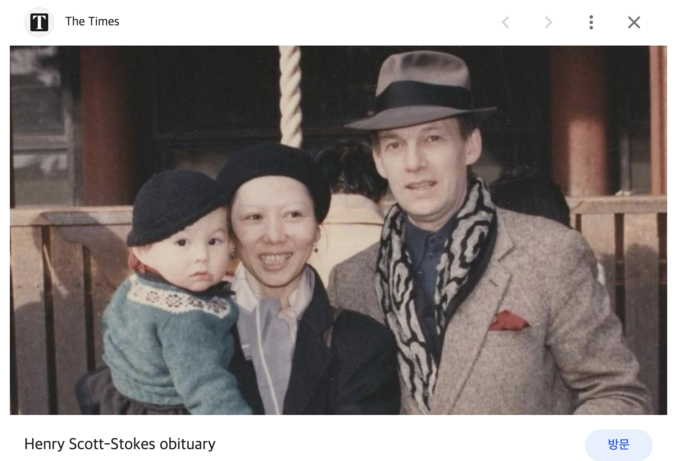
뉴욕타임즈 도쿄 지국장 헨리 스콧 스톡스는 5.18 당시 광주를 직접 취재했고 김대중과 12번 이상 인터뷰를 진행했다. 김대중 구명에 가장 앞장 선 사람이다. 김대중 전 대통령이 미국을 비롯한 서구에 한국 민주화 운동의 중심인물로 알려진 것은 그와 뉴욕타임즈의 공이라 해도 과언이 아니다.
그런데 국내에는 많이 알려지지는 않았지만, 그토록 김대중을 지지했던 그가 죽기 전 쓴 책에서 ‘김대중에게 완전히 속았다. 광주사건은 김대중이 기획한 일이다.’라고 주장했다. 상당히 충격적인 내용이다. 김대중 전 대통령은 민주화의 영웅인가?
아래에 해당 자료를 공유한다.
Henry Scott Stokes, Fallacies in the Allied Nations' Historical Perception as Observed by a British Journalist, November 2016, Hamilton Books, pp.85-89
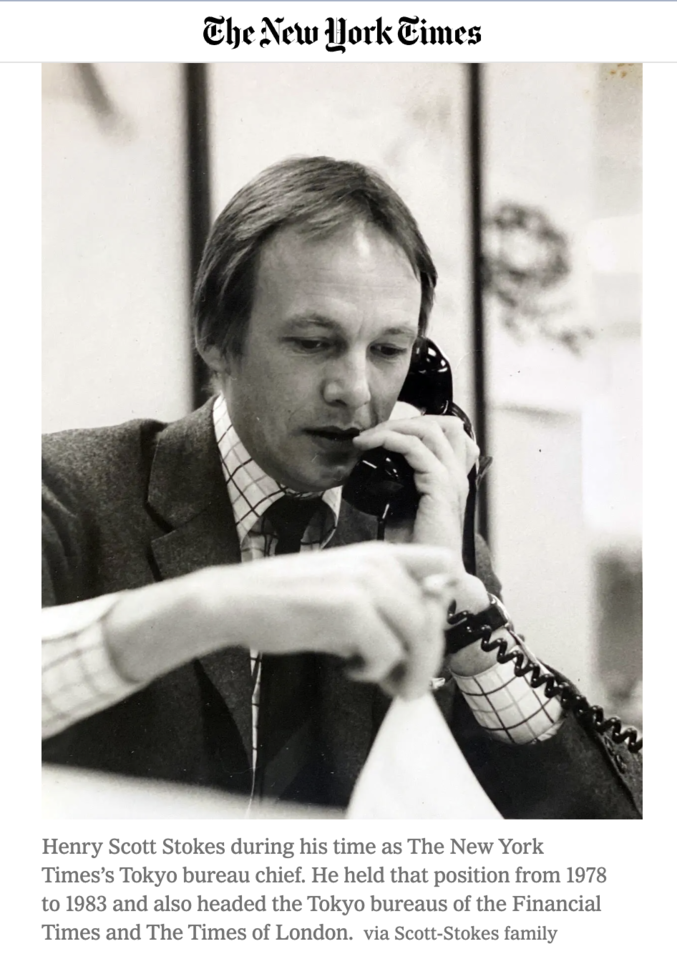
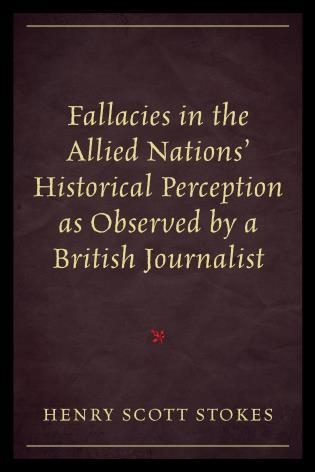
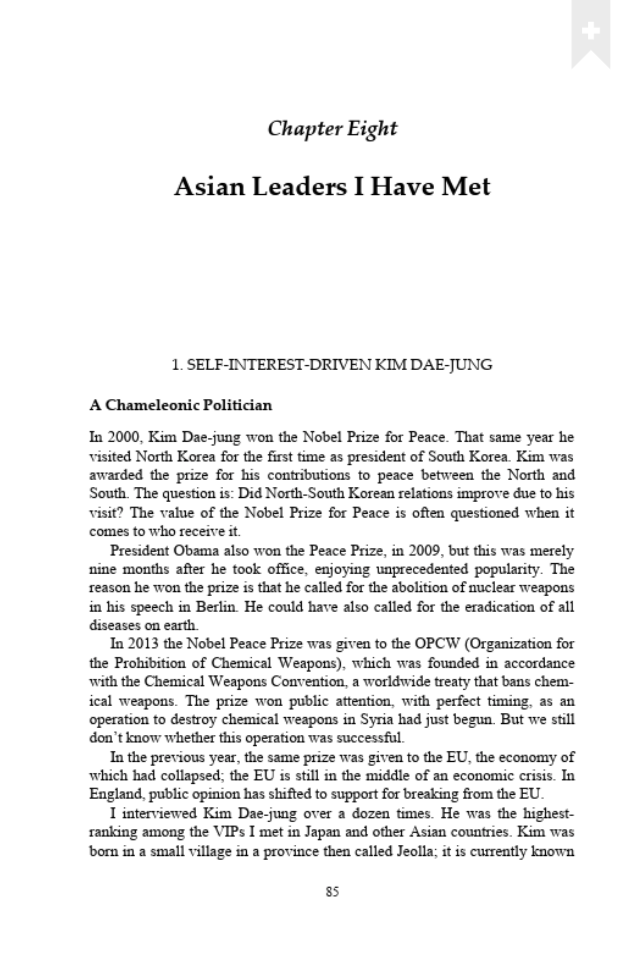
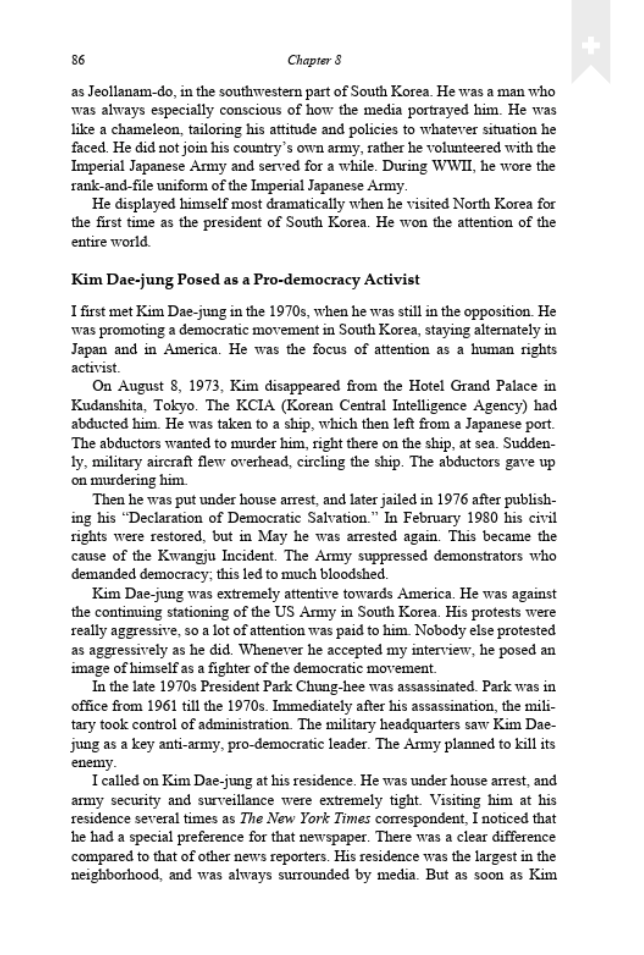
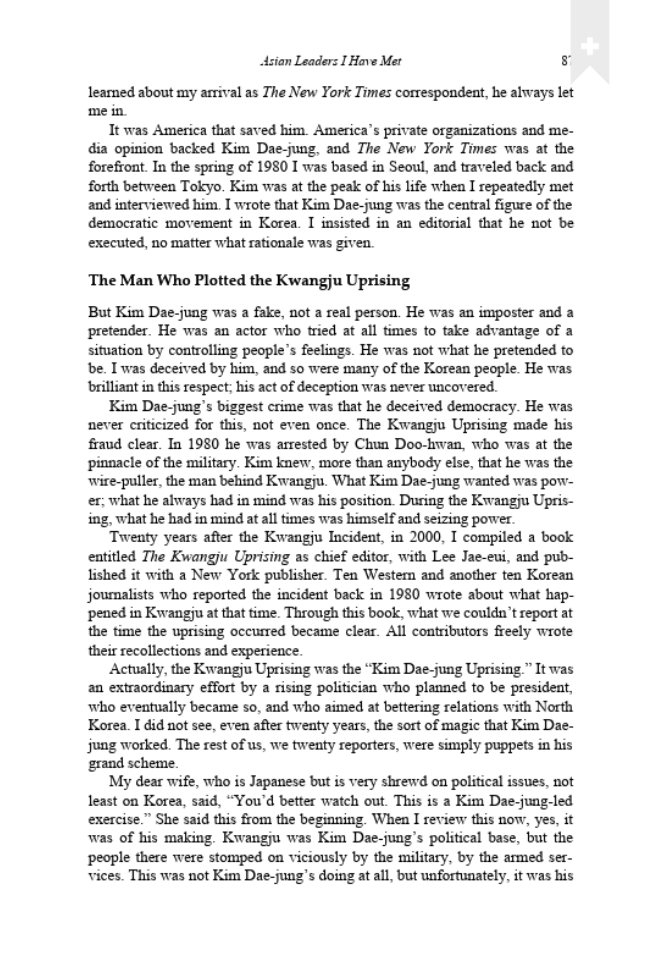
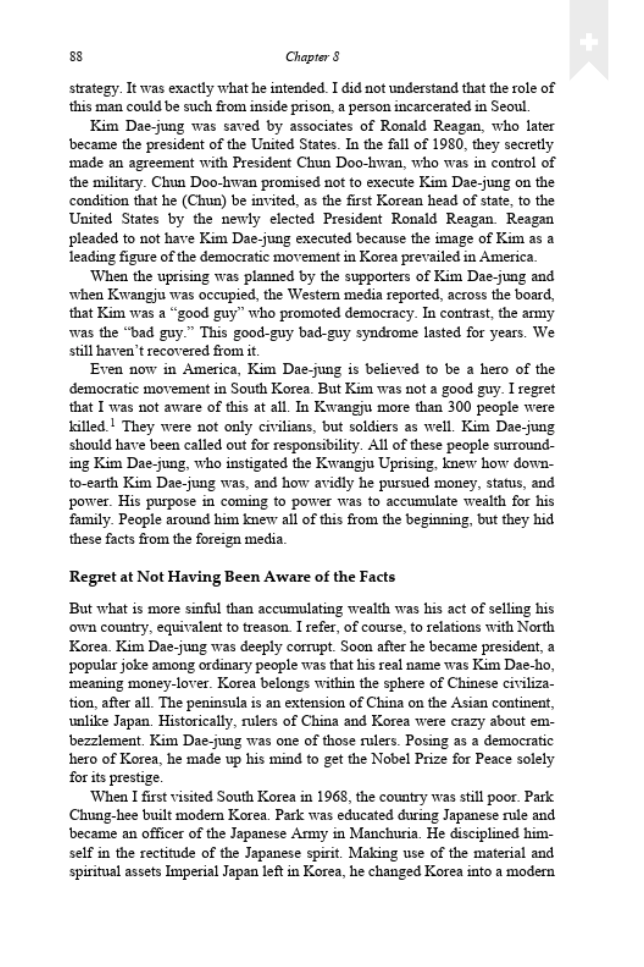
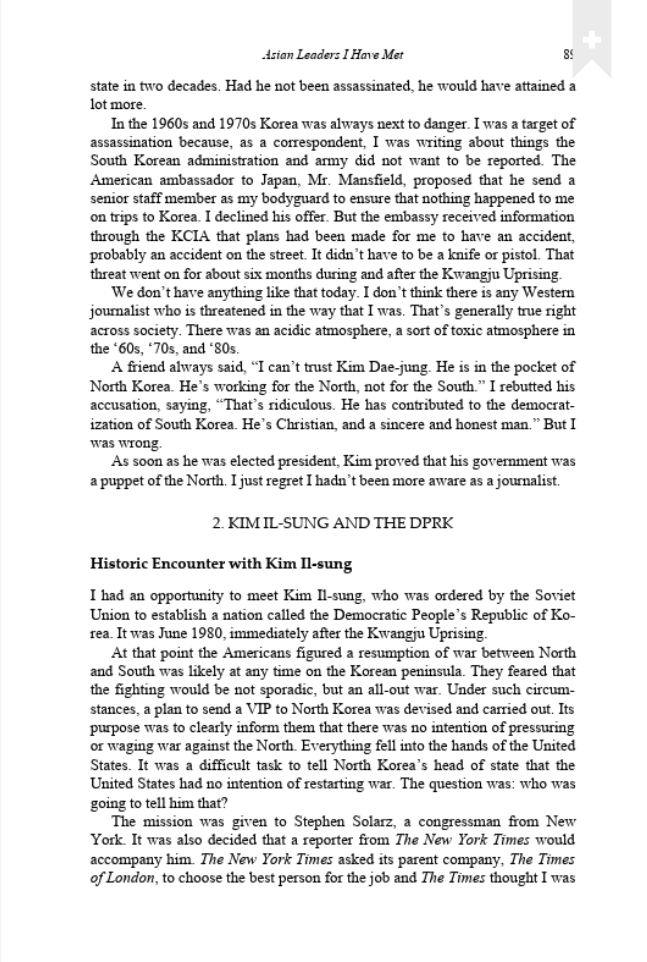
Chapter Eight
Asian Leaders I Have Met
1. SELF-INTEREST-DRIVEN KIM DAE-JUNG
A Chameleonic Politician
In 2000, Kim Dae-jung won the Nobel Prize for Peace. That same year he visited North Korea for the first time as president of South Korea. Kim was awarded the prize for his contributions to peace between the North and South. The question is: Did North-South Korean relations improve due to his visit? The value of the Nobel Prize for Peace is often questioned when it comes to who receive it.
President Obama also won the Peace Prize, in 2009, but this was merely nine months after he took office, enjoying unprecedented popularity. The reason he won the prize is that he called for the abolition of nuclear weapons in his speech in Berlin. He could have also called for the eradication of all diseases on earth.
In 2013 the Nobel Peace Prize was given to the OPCW (Organization for the Prohibition of Chemical Weapons), which was founded in accordance with the Chemical Weapons Convention, a worldwide treaty that bans chemical weapons. The prize won public attention, with perfect timing, as an operation to destroy chemical weapons in Syria had just begun. But we still don’t know whether this operation was successful.
In the previous year, the same prize was given to the EU, the economy of which had collapsed; the EU is still in the middle of an economic crisis. In England, public opinion has shifted to support for breaking from the EU.
I interviewed Kim Dae-jung over a dozen times. He was the highest-ranking among the VIPs I met in Japan and other Asian countries. Kim was born in a small village in a province then called Jeolla; it is currently known as Jeollanam-do, in the southwestern part of South Korea. He was a man who was always especially conscious of how the media portrayed him. He was like a chameleon, tailoring his attitude and policies to whatever situation he faced. He did not join his country’s own army, rather he volunteered with the Imperial Japanese Army and served for a while. During WWII, he wore the rank-and-file uniform of the Imperial Japanese Army.
He displayed himself most dramatically when he visited North Korea for the first time as the president of South Korea. He won the attention of the entire world.
Kim Dae-jung Posed as a Pro-democracy Activist
I first met Kim Dae-jung in the 1970s, when he was still in the opposition. He was promoting a democratic movement in South Korea, staying alternately in Japan and in America. He was the focus of attention as a human rights activist.
On August 8, 1973, Kim disappeared from the Hotel Grand Palace in Kudanshita, Tokyo. The KCIA (Korean Central Intelligence Agency) had abducted him. He was taken to a ship, which then left from a Japanese port. The abductors wanted to murder him, right there on the ship, at sea. Suddenly, military aircraft flew overhead, circling the ship. The abductors gave up on murdering him.
Then he was put under house arrest, and later jailed in 1976 after publishing his “Declaration of Democratic Salvation.” In February 1980 his civil rights were restored, but in May he was arrested again. This became the cause of the Kwangju Incident. The Army suppressed demonstrators who demanded democracy; this led to much bloodshed.
Kim Dae-jung was extremely attentive towards America. He was against the continuing stationing of the US Army in South Korea. His protests were really aggressive, so a lot of attention was paid to him. Nobody else protested as aggressively as he did. Whenever he accepted my interview, he posed an image of himself as a fighter of the democratic movement.
In the late 1970s President Park Chung-hee was assassinated. Park was in office from 1961 till the 1970s. Immediately after his assassination, the military took control of administration. The military headquarters saw Kim Dae-jung as a key anti-army, pro-democratic leader. The Army planned to kill its enemy.
I called on Kim Dae-jung at his residence. He was under house arrest, and army security and surveillance were extremely tight. Visiting him at his residence several times as The New York Times correspondent, I noticed that he had a special preference for that newspaper. There was a clear difference compared to that of other news reporters. His residence was the largest in the neighborhood, and was always surrounded by media. But as soon as Kim learned about my arrival as The New York Times correspondent, he always let me in.
It was America that saved him. America’s private organizations and media opinion backed Kim Dae-jung, and The New York Times was at the forefront. In the spring of 1980 I was based in Seoul, and traveled back and forth between Tokyo. Kim was at the peak of his life when I repeatedly met and interviewed him. I wrote that Kim Dae-jung was the central figure of the democratic movement in Korea. I insisted in an editorial that he not be executed, no matter what rationale was given.
The Man Who Plotted the Kwangju Uprising
But Kim Dae-jung was a fake, not a real person. He was an imposter and a pretender. He was an actor who tried at all times to take advantage of a situation by controlling people’s feelings. He was not what he pretended to be. I was deceived by him, and so were many of the Korean people. He was brilliant in this respect; his act of deception was never uncovered.
Kim Dae-jung’s biggest crime was that he deceived democracy. He was never criticized for this, not even once. The Kwangju Uprising made his fraud clear. In 1980 he was arrested by Chun Doo-hwan, who was at the pinnacle of the military. Kim knew, more than anybody else, that he was the wire-puller, the man behind Kwangju. What Kim Dae-jung wanted was power; what he always had in mind was his position. During the Kwangju Uprising, what he had in mind at all times was himself and seizing power.
Twenty years after the Kwangju Incident, in 2000, I compiled a book entitled The Kwangju Uprising as chief editor, with Lee Jae-eui, and published it with a New York publisher. Ten Western and another ten Korean journalists who reported the incident back in 1980 wrote about what happened in Kwangju at that time. Through this book, what we couldn’t report at the time the uprising occurred became clear. All contributors freely wrote their recollections and experience.
Actually, the Kwangju Uprising was the “Kim Dae-jung Uprising.” It was an extraordinary effort by a rising politician who planned to be president, who eventually became so, and who aimed at bettering relations with North Korea. I did not see, even after twenty years, the sort of magic that Kim Dae-jung worked. The rest of us, we twenty reporters, were simply puppets in his grand scheme.
My dear wife, who is Japanese but is very shrewd on political issues, not least on Korea, said, “You’d better watch out. This is a Kim Dae-jung-led exercise.” She said this from the beginning. When I review this now, yes, it was of his making. Kwangju was Kim Dae-jung’s political base, but the people there were stormed on viciously by the military, by the armed services. This was not Kim Dae-jung’s doing at all, but unfortunately, it was his strategy. It was exactly what he intended. I did not understand that the role of this man could be such from inside prison, a person incarcerated in Seoul.
Kim Dae-jung was saved by associates of Ronald Reagan, who later became the president of the United States. In the fall of 1980, they secretly made an agreement with President Chun Doo-hwan, who was in control of the military. Chun Doo-hwan promised not to execute Kim Dae-jung on the condition that he (Chun) be invited, as the first Korean head of state, to the United States by the newly elected President Ronald Reagan. Reagan pleaded to not have Kim Dae-jung executed because the image of Kim as a leading figure of the democratic movement in Korea prevailed in America.
When the uprising was planned by the supporters of Kim Dae-jung and when Kwangju was occupied, the Western media reported, across the board, that Kim was a “good guy” who promoted democracy. In contrast, the army was the “bad guy.” This good-guy bad-guy syndrome lasted for years. We still haven’t recovered from it.
Even now in America, Kim Dae-jung is believed to be a hero of the democratic movement in South Korea. But Kim was not a good guy. I regret that I was not aware of this at all. In Kwangju more than 300 people were killed. They were not only civilians, but soldiers as well. Kim Dae-jung should have been called out for responsibility. All of these people surrounding Kim Dae-jung, who instigated the Kwangju Uprising, knew how down-to-earth Kim Dae-jung was, and how avidly he pursued money, status, and power. His purpose in coming to power was to accumulate wealth for his family. People around him knew all of this from the beginning, but they hid these facts from the foreign media.
Regret at Not Having Been Aware of the Facts
But what is more sinful than accumulating wealth was his act of selling his own country, equivalent to treason. I refer, of course, to relations with North Korea. Kim Dae-jung was deeply corrupt. Soon after he became president, a popular joke among ordinary people was that his real name was Kim Dae-ho, meaning money-lover. Korea belongs within the sphere of Chinese civilization, after all. The peninsula is an extension of China on the Asian continent, unlike Japan. Historically, rulers of China and Korea were crazy about embezzlement. Kim Dae-jung was one of those rulers. Posing as a democratic hero of Korea, he made up his mind to get the Nobel Prize for Peace solely for its prestige.
When I first visited South Korea in 1968, the country was still poor. Park Chung-hee built modern Korea. Park was educated during Japanese rule and became an officer of the Japanese Army in Manchuria. He disciplined himself in the rectitude of the Japanese spirit. Making use of the material and spiritual assets Imperial Japan left in Korea, he changed Korea into a modern state in two decades. Had he not been assassinated, he would have attained a lot more.
In the 1960s and 1970s Korea was always next to danger. I was a target of assassination because, as a correspondent, I was writing about things the South Korean administration and army did not want to be reported. The American ambassador to Japan, Mr. Mansfield, proposed that he send a senior staff member as my bodyguard to ensure that nothing happened to me on trips to Korea. I declined his offer. But the embassy received information through the KCIA that plans had been made for me to have an accident, probably an accident on the street. It didn’t have to be a knife or pistol. That threat went on for about six months during and after the Kwangju Uprising.
We don’t have anything like that today. I don’t think there is any Western journalist who is threatened in the way that I was. That’s generally true right across society. There was an acidic atmosphere, a sort of toxic atmosphere in the ‘60s, ‘70s, and ‘80s.
A friend always said, “I can’t trust Kim Dae-jung. He is in the pocket of North Korea. He’s working for the North, not for the South.” I rebutted his accusation, saying, “That’s ridiculous. He has contributed to the democratization of South Korea. He’s Christian, and a sincere and honest man.” But I was wrong.
As soon as he was elected president, Kim proved that his government was a puppet of the North. I just regret I hadn’t been more aware as a journalist.
제8장
내가 만난 아시아 지도자들
1. 자기이익에 따라 움직인 김대중
카멜레온 같은 정치인
2000년, 김대중은 노벨 평화상을 수상했다. 그해 그는 대한민국 대통령으로서 처음으로 북한을 방문했다. 김대중은 남북 간 평화에 기여했다는 공로로 상을 받았다. 그러나 질문은 이것이다. 그의 방북으로 남북 관계가 실제로 개선되었는가? 평화상으로서 노벨상의 가치는 수상자를 두고 종종 의문이 제기된다.
오바마 대통령도 2009년에 평화상을 받았지만, 이는 취임한 지 불과 아홉 달 만의 일이었다. 그는 압도적인 인기를 누리고 있었는데, 수상 이유는 베를린 연설에서 핵무기 폐기를 주장했기 때문이다. 하지만 그는 지구상의 모든 질병 퇴치도 주장할 수 있었을 것이다.
2013년에는 노벨 평화상이 OPCW(화학무기금지기구)에 돌아갔다. 이 기구는 화학무기금지협약에 따라 창설된 전 세계적 기구로 화학무기를 금지한다. 공교롭게도 시리아에서 화학무기를 파괴하는 작전이 막 시작되던 시점이어서 대중의 큰 관심을 끌었다. 그러나 그 작전이 실제로 성공했는지는 아직도 알 수 없다.
그 전해에는 EU가 같은 상을 받았는데, 당시 유럽연합 경제는 붕괴 상태였고 한창 경제 위기 한가운데 있었다. 영국에서는 EU 탈퇴를 지지하는 여론이 점점 강해지고 있었다.
나는 김대중을 10여 차례 넘게 인터뷰했다. 그가 내가 일본과 아시아에서 만난 VIP들 중 가장 높은 지위에 있었다. 김대중은 전라라는 이름으로 불리던 작은 시골 마을에서 태어났는데, 지금은 전라남도라 불린다. 그는 항상 언론이 자신을 어떻게 묘사하는지에 매우 신경 쓰는 사람이었다. 카멜레온처럼 상황에 따라 태도와 정책을 바꿨다. 그는 자국의 군대에 들어가지 않고, 오히려 일본제국군에 자원해 복무했다. 2차 세계대전 동안 그는 제국 일본군의 일반 병사 제복을 입었다.
그가 가장 극적으로 자신을 드러낸 것은 대통령으로서 처음으로 북한을 방문했을 때였다. 그는 전 세계의 이목을 끌었다.
민주화 운동가로서의 김대중
내가 처음 김대중을 만난 것은 1970년대, 그가 아직 야당에 있을 때였다. 그는 민주화 운동을 이끌고 있었고, 일본과 미국을 오가며 인권운동가로 주목받았다.
1973년 8월 8일, 김대중은 도쿄 구단시타에 있는 호텔 그랜드 팰리스에서 갑자기 사라졌다. 중앙정보부(KCIA)가 그를 납치한 것이었다. 그는 일본 항구에서 배에 태워졌다. 납치범들은 그를 배 위에서 곧바로 살해하려 했다. 그 순간 군용기가 상공을 선회하며 배를 감시했다. 납치범들은 결국 살해 계획을 포기했다.
그 후 김대중은 가택연금 상태에 놓였고, 1976년에는 「민주구국선언」을 발표한 후 투옥되었다. 1980년 2월 그의 시민권이 복원되었지만, 5월에 다시 체포되었다. 이것이 곧 광주사태의 원인이 되었다. 군은 민주화를 요구하는 시위대를 진압했고, 그 결과 많은 피가 흘렀다.
김대중은 미국에 대해 매우 민감하게 반응했다. 그는 주한미군의 지속적 주둔에 반대했고, 그 시위는 매우 공격적이었다. 그만큼 많은 주목을 받았다. 그는 항상 민주주의 투사의 이미지를 의도적으로 만들어갔다.
1970년대 말 박정희 대통령이 암살당했다. 1961년부터 1970년대까지 집권했던 박 대통령 사후 군부가 정권을 장악했다. 군부는 김대중을 반군부·친민주 지도자로 간주했고, 제거 대상으로 보았다.
나는 가택연금 중인 김대중의 자택을 방문했다. 그의 집은 군의 감시와 경계가 극도로 삼엄했다. 뉴욕타임스 특파원으로서 여러 번 그를 찾아갔을 때, 그는 유난히 뉴욕타임스를 특별히 선호한다는 것을 알았다. 다른 언론사 기자들과는 확연히 달랐다. 그의 집은 동네에서 가장 크고, 항상 언론에 포위돼 있었지만, 내가 뉴욕타임스 기자라는 것을 알면 언제나 나를 들여보냈다.
그를 구한 것은 결국 미국이었다. 미국의 민간단체와 언론 여론이 김대중을 지지했고, 뉴욕타임스가 그 중심에 있었다. 1980년 봄, 나는 서울과 도쿄를 오가며 활동했는데, 김대중은 인생의 절정기에 있었다. 나는 사설에서 그가 어떤 이유로든 사형당해서는 안 된다고 주장했다.
광주사태를 기획한 남자
그러나 김대중은 진짜가 아니었다. 그는 사기꾼이자 위선자였다. 그는 늘 사람들의 감정을 이용해 상황을 장악하려는 연기자였다. 그는 자신이 주장하는 인물이 아니었다. 나도, 수많은 한국인도 그에게 속았다. 그는 속임수에 천재적이었으며, 그 진실은 끝내 드러나지 않았다.
김대중의 가장 큰 죄는 민주주의를 속였다는 점이다. 그는 한 번도 그 죄로 비판받지 않았다. 광주사태가 그의 사기를 명확히 드러냈다. 1980년 그는 군부 정점에 있던 전두환에게 체포되었다. 김대중은 자신이 광주의 배후라는 것을 누구보다 잘 알고 있었다. 그가 원한 것은 권력이었고, 그의 머릿속에는 항상 권력 장악만 있었다.
광주사태가 일어난 지 20년 후인 2000년, 나는 『광주사태』라는 책을 이재의와 함께 편집해 뉴욕에서 출판했다. 당시 사건을 보도했던 20명의 서구 및 한국 기자들이 1980년의 기억과 경험을 기고했다. 그 결과 당시 보도할 수 없었던 진실들이 드러났다.
실제로 광주사태는 “김대중 사태”였다. 대통령이 되려 했던 한 정치인의 치밀한 정치적 술수였던 것이다. 우리 기자 20명은 그의 거대한 계획 속에서 그저 꼭두각시에 불과했다.
아내(일본인)는 정치적 감각이 뛰어났는데, 처음부터 “이건 김대중이 꾸민 일”이라고 경고했다. 지금 돌이켜보면 맞는 말이었다. 광주는 그의 정치적 기반이었으나, 불행히도 군부의 폭력으로 짓밟혔다. 그러나 그것 역시 그의 전략이었다.
그는 결국 로널드 레이건과 그의 측근들 덕분에 목숨을 건졌다. 1980년 가을, 미국은 군부를 장악한 전두환과 은밀히 합의했다. 전두환은 김대중을 처형하지 않는 조건으로, 신임 대통령 레이건이 미국에 초청하기로 했다. 레이건은 김대중이 민주화 운동의 상징으로 여겨지던 미국 내 여론을 의식해 그의 사형을 막으려 했다.
광주사태 당시, 서방 언론은 일제히 김대중을 ‘민주주의 영웅’으로 보도했다. 반면 군은 ‘악역’으로 몰렸다. 이 ‘선악 구도’는 오랫동안 지속되었다.
오늘날까지도 미국에서는 김대중을 민주화의 영웅으로 믿는다. 그러나 그는 결코 선한 인물이 아니었다. 광주에서는 300명 이상이 죽었다. 민간인뿐 아니라 군인도 있었다. 김대중은 책임을 져야 했다. 그러나 그는 오직 권력과 부를 축적하는 데 관심이 있었다. 그의 주변 사람들은 이 사실을 다 알면서도 서방 언론에는 감췄다.
사실을 몰랐던 것에 대한 후회
부를 축적한 것보다 더 죄악이었던 것은 나라를 팔아넘긴 일이었다. 이는 사실상 반역이었다. 나는 그의 북한과의 관계를 말하는 것이다. 그는 심각하게 부패했다. 대통령이 된 직후, 한국 사람들 사이에서는 그의 본명이 ‘김대호(돈을 사랑하는 자)’라는 농담이 돌았다.
한국은 본래 중국 문명권의 일부다. 중국과 한국의 지배자들은 전통적으로 착복에 집착했다. 김대중도 그중 하나였다. 그는 민주 영웅을 가장해 노벨 평화상을 자신의 명성 확보 수단으로 삼았다.
내가 처음 한국을 방문한 1968년, 나라는 여전히 가난했다. 박정희는 현대 한국을 세운 인물이었다. 그는 일본군 장교 출신이었고, 일본 정신으로 자신을 훈련시켰다. 일본이 남긴 자산을 바탕으로 그는 20년 만에 한국을 근대 국가로 탈바꿈시켰다. 암살만 당하지 않았다면 더 많은 업적을 남겼을 것이다.
1960~70년대 한국은 늘 위험했다. 나는 종종 암살 위협을 받았다. KCIA는 나를 교통사고로 위장해 제거하려 했다는 정보를 입수했다. 광주사태 전후 약 6개월 동안 이런 위협은 지속되었다.
오늘날 서방 언론인들은 그런 위협을 거의 받지 않는다. 그러나 그 시절 한국 사회는 독성이 가득한 분위기였다.
주변 사람들은 늘 “김대중은 북한의 꼭두각시다. 남한을 위한 사람이 아니다”라고 경고했지만, 나는 그가 민주화에 기여했고, 기독교인으로 진실된 사람이라고 반박했다. 그러나 내가 틀렸다. 그는 결국 대통령이 된 후 북한의 꼭두각시임을 증명했다. 나는 기자로서 이 사실을 더 일찍 알아차리지 못한 것을 후회한다.


